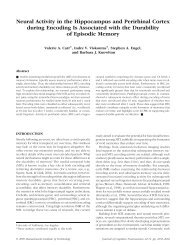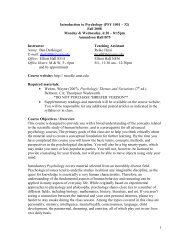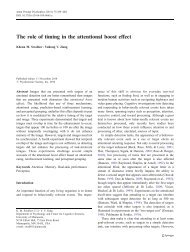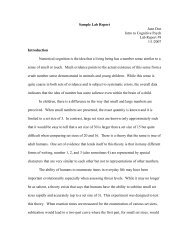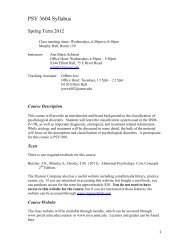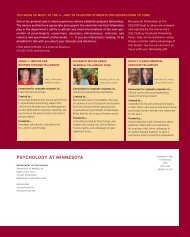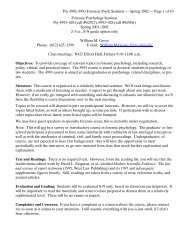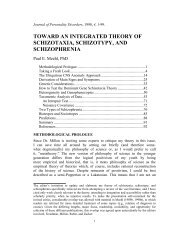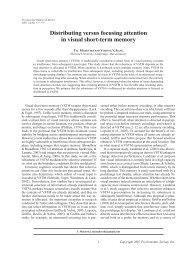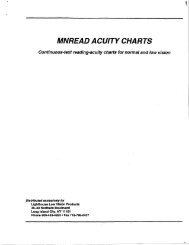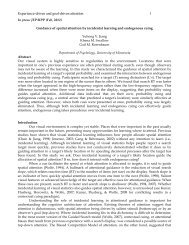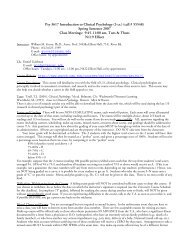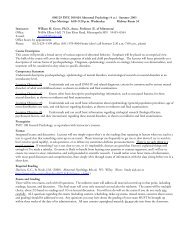PSY 3051: Introduction to Cognitive Psychology - University of ...
PSY 3051: Introduction to Cognitive Psychology - University of ...
PSY 3051: Introduction to Cognitive Psychology - University of ...
Create successful ePaper yourself
Turn your PDF publications into a flip-book with our unique Google optimized e-Paper software.
Here is a preliminary outline <strong>of</strong> the materials that we will cover in this course. The exact timing <strong>of</strong> thelectures is subject <strong>to</strong> change: we may end up spending more time than is listed here on <strong>to</strong>pics thatstrike you as especially interesting or difficult.Date Day Quiz Topic Readings9/6 Tu attendance <strong>Introduction</strong> 1: <strong>Cognitive</strong><strong>Psychology</strong>Potter (1975). Meaning in visualsearch; Reisberg Chapter 1.9/8 Th Q1 <strong>Introduction</strong> II: Themes Bloom (2001): Word learning9/13 Tu Q2 Attention 1: Consequence <strong>of</strong>attentionLavie (2005). Selective attentionunder load. Reisberg Chapter 4.9/15 Th Q3 Attention 2: Object-based attention Scholl (2001): Objects & attention9/20 Tu attendance Lab 1: Visual search Report due: 9/27 at 9:45am9/22 Th Q4 Attention 3: Visual search(provides background for Lab 1)Wolfe (1998). 1,000,000 trials <strong>of</strong>visual search.9/27 Tu Q5 Attention 4: Divided attention Pashler et al. (2001). Attention andperformance.9/29 Th Q6 Memory 1: Amnesia, memory bytimeLuck & Vogel (1997). Capacity <strong>of</strong>visual working memory. ReisbergChapter 5.10/4 Tu attendance Lab 2: Serial position curve Report due: 10/11 at 9:45am10/6 Th Q7 Memory 2: Amnesia, memory bytypeNYTimes (08): HM’s Obituary.Reisberg Chapter 6.10/11 Tu Q8 Memory 3: Declarative memory Karpicke & Roediger (08).Retrieval for learning. ReisbergChapter 7.10/13 Th Q9 Memory 4: Memory asreconstructionL<strong>of</strong>tus (03): make-believememories. Reisberg Chapter 8.10/18 Tu Q10 Emotion & Cognition Susskind & Anderson (2008).Facial expression form & function.10/20 Th Midterm Exam 110/25 Tu Q11 Knowledge 1: Concept &CategorizationLombrozo (2009). Explanation andcategorization. Reisberg Chapter 9.10/27 Th Q12 Knowledge 2: Number Feigenson (04): Number system.11/1 Tu Q13 Knowledge 3: Reasoning & Reisberg Chapters 12, 13, 14.Decision11/3 Th Q14 Knowledge 4: Theory <strong>of</strong> Mind 1: Saxe (04): Reading your mindBasics11/8 Tu Q15 Vision 1: <strong>Introduction</strong> Reisberg Chapter 3.11/10 Th attendance Lab 3: Face perception Report due 11/17 at 9:45am11/15 Tu Q16 Vision 2: Face perception Moscovitch et al. (1997). What isspecial about face recognition?11/17 Th Q17 Vision 3: What, where, and how Goodale (04): duplex vision11/22 Tu Midterm Exam 211/24 Th Thanksgiving, no class11/29 Tu Q18 Research Methods Kosslyn et al. (2003). Mentalimagery. Reisberg Chapter 2.12/1 Th Q19 Language 1: Language acquisition Johnson & Newport (1989).Critical period in L2 learning.Fall 2011 <strong>PSY</strong> <strong>3051</strong> at umn.edu3Intro <strong>to</strong> <strong>Cognitive</strong> <strong>Psychology</strong>



